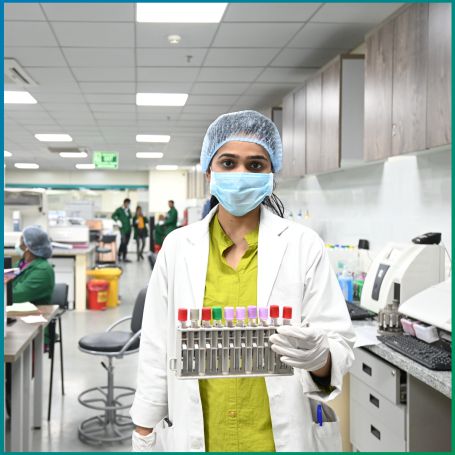
A C/S tissue test involves the collection of a tissue sample from an infected area, such as from an abscess, wound, or surgical site.

The C/S tissue test (Culture and Sensitivity tissue test) is a laboratory diagnostic procedure used to identify infections within tissues and to determine the most effective treatment options. It is commonly performed when a patient presents with symptoms of an infection that affects deeper body tissues, such as abscesses, wounds, or organ infections. The test involves collecting a tissue sample from the affected area, which is then cultured in a laboratory to identify the causative microorganism, followed by sensitivity testing to determine which antibiotics or medications are most effective against the pathogen.
Diagnopein offers the C/S Tissue Test in Pune, a crucial pathology lab test to identify infections in tissue samples. This test helps detect harmful microorganisms and provides insights into the most effective antibiotics for treatment. Our advanced techniques ensure accurate results and timely diagnoses, assisting doctors in prescribing the right treatment plan. Whether you're experiencing unexplained symptoms or need a comprehensive infection analysis, our C/S Tissue Test offers a reliable solution. Trust Diagnopein, your preferred pathology lab in Pune, for precise and professional testing services. Book your test today for accurate and fast results.
The C/S tissue test is used for a variety of reasons, primarily for diagnosing and managing infections in deeper tissues. The main purposes include:
1] Identifying the Causative Pathogen: When a patient has an infection that is not resolving with standard treatments, the C/S tissue test helps identify the specific bacteria, fungi, or other pathogens responsible for the infection. This is critical in cases of deep or chronic infections.
2] Guiding Appropriate Treatment: The sensitivity portion of the test helps determine which antibiotics, antifungal medications, or other treatments will be most effective against the pathogen. This is particularly important when the infection is resistant to common medications or when there is a need to prevent further complications.
3] Monitoring Chronic or Recurrent Infections: For patients with ongoing or recurring infections, such as diabetic foot ulcers or chronic osteomyelitis, the test helps track the infection’s progress and identify any changes in microbial resistance.
4] Pre-surgical Screening: A C/S tissue test may be performed before a surgical procedure, especially if an infection is suspected, to help identify any pathogens and reduce the risk of postoperative complications.
5] Post-Surgical Infections: The test can be used to diagnose infections that may develop after surgery, such as wound infections, abscesses, or surgical site infections.
The C/S tissue test is typically performed in a clinical or hospital setting. The procedure for collecting the tissue sample depends on the location of the infection, but it generally follows these steps:
1] Preparation: The patient is typically asked to lie down, and the area from which the tissue sample will be taken is cleaned and sterilized to reduce the risk of contamination. Local anesthesia may be applied to minimize discomfort, especially if the tissue sample is being taken from an area that could cause pain or discomfort.
2] Tissue Collection: A healthcare provider uses a sterile instrument, such as a biopsy needle, scalpel, or punch biopsy tool, to remove a small sample of tissue from the infected area. The tissue is carefully collected to avoid further injury to the surrounding area and ensure an adequate sample for testing.
3] Sample Transportation: The collected tissue sample is placed in a sterile container and transported to the laboratory as quickly as possible for processing. In some cases, the tissue may be placed in a special medium that helps preserve the integrity of the sample.
4] Culture and Sensitivity Testing: Once at the laboratory, the tissue sample is cultured to encourage the growth of microorganisms. The lab technicians monitor the growth and identify the pathogen using various techniques, such as staining, microscopy, or molecular testing. Sensitivity testing is then performed by exposing the cultured microorganism to various antibiotics to determine which ones inhibit its growth.
5] Result Interpretation: After the culture and sensitivity results are available (usually in 2-5 days), the healthcare provider will review the findings. The physician uses this information to select the most appropriate treatment for the infection, including the correct antibiotics or antifungal agents.
Choosing Diagnopein for your C/S tissue test ensures that you receive the highest standard of diagnostic care with accurate and timely results. At Diagnopein, we combine cutting-edge laboratory technology with experienced medical professionals to deliver precise identification of pathogens and their antibiotic sensitivities. Our state-of-the-art facilities ensure that tissue samples are handled with the utmost care and processed efficiently, minimizing turnaround time. Whether you're dealing with chronic infections, post-surgical complications, or abscesses, Diagnopein offers expert guidance to help determine the most effective treatment options. With a commitment to patient comfort, confidentiality, and excellence in service, Diagnopein is the trusted choice for reliable, comprehensive infection testing and management.
1. Culture Method
2. Sample
3. Colony Count
4. Organism(s) Isolated
5. Culture Report: Culture yields growth of
6. Culture isolated after 7 days :
7. Culture isolated after 14 days:
8. Culture isolated after 21 days:
9. Ampicillin
10. Amikacin
11. Amoxicillin clavulanate
12. cefoperazon+sulbactam
13. Cefuroxime
14. Cefepime
15. Cefotaxime
16. Ciprofloxacin
17. Ertapenem
18. Gentamicin
19. Imipenem
20. Meropenem
21. Norfloxacin
22. Nitrofurantoin
23. Piperacillin-tazobactam
24. Trimethoprim-Sulfamethoxazole (Cotrimoxazole)
It can identify infections such as chronic wound infections, osteomyelitis (bone infections), abscesses, soft tissue infections, and post-surgical infections.
There is typically no special preparation required. Your healthcare provider will provide instructions if necessary.
It is used to diagnose infections in deep tissues, such as abscesses or chronic wounds, and to guide appropriate treatment based on the pathogen’s sensitivity to antibiotics.
Yes, the C/S tissue test is generally safe. The procedure is performed under sterile conditions to minimize the risk of additional infection.